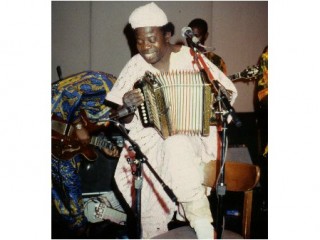
I. K. Dairo biography
Date of birth : 1931-01-06
Date of death : 1996-02-07
Birthplace : Offa, Kwara State, Nigeria
Nationality : Nigerian
Category : Arts and Entertainment
Last modified : 2011-11-08
Credited as : Singer, juju music,
0 votes so far
The son of a carpenter, Isaiah Kehinde Dairo was born in Nigeria. His early interest in music reportedly emerged when his father made a drum for him, which he carried around with him at all times. Unable to finish his education, Dairo worked as an apprentice barber and learned to play and make drums in his free time. By 1942 he had joined his first juju band. (Juju music is an upbeat urban music style that began in the 1930s; it is rooted in Yoruba dance drumming with traditional call-and-response patterns.)
From 1942 to 1946, Dairo traveled western Nigeria as a migrant farm laborer, cloth merchant, carpenter, and road builder. By night he played with juju bands led by pioneering musicians such as Oladele Oro and Ojoge Daniel. In 1950 he joined the Rolling Dollars dance band, considered important contributors to the development of modern juju. Settling in Ibadan, he began a decade-long apprenticeship under Daniel that allowed him to explore and polish his own musical ideas. In 1956, he formed a ten-member group called the Morning Star Orchestra, which would later be renamed the Blue Spots.
Dairo was not entirely content with playing traditional juju and embarked on a path of experimentation that revealed his talents as a composer/arranger and forever changed the sound of the music. In addition to the influences of juju pioneers like Ojoge Daniel, Dairo was inspired by the West African highlife style as performed by E. T. Mensah, Victor Olaiya, Bobby Benson, and the Ramblers Dance Band. He began to research and incorporate local oral traditions into his music, while at the same time adding modern elements like the ten-button accordion and Latin American rhythms. Although he sang mostly in Yoruba (a Niger-Congo language of southwestern Nigeria and parts of Togo and Benin), he also used other local languages such as Hausa, Urhobo, and Itsekiri, as well as English, the colonial language of Nigeria. Lyrics, culture, and innovations aside, another factor contributing to Dairo's success was his ability to write music that fit into the format of the three-minute song.
In 1960 Nigeria gained independence and Dairo's parallel rise to stardom made him a favorite of kings, businessmen, ambassadors, and heads of state. In 1963 Queen Elizabeth named him a Member of the British Empire (MBE) for his cultural contributions to the Commonwealth, making him the only African musician to receive that honor. Dairo was also a clear favorite among the Nigerian people, noted Andrew C. Frankel on the Roots World website, quoting the Nigerian magazine Spear, whose readers called him the "Shakespeare of Music" and "an earthly god of music."
During the 1960s Dairo enjoyed increasing success with a number of songs about women, their elegance, and beauty--best-selling hits like "Salome." After a 1965 performance at Westminster Theatre in London, Dairo went on to participate in the World Negro Arts Festival held in Dakar, Senegal.
Despite Dairo's immense popularity, the juju music of Nigeria's poor had yet to replace highlife as the nation's favorite. In the late 1960s, during the Nigerian Civil War (a conflict he predicted in his 1963 song "Ka Sora") Dairo and his band released a stream of successful singles that would, by 1970, establish juju as Nigeria's national sound. This popularity continued throughout the decade with the release of albums such as Kekere, Talaka Nke Ebi, and Emini Oni Gbe Sajo.
By 1980 Dairo had been eclipsed as the king of juju by artists such as King Sunny Ade and Ebenezer Obey. Performing less and less often, he managed several clubs and a Lagos hotel to earn a living. Dairo was a founding father of the Musical Copyright Society of Nigeria and served as Nigerian chapter resident of the Performing Rights Society. He also became a minister in the syncretic Christian Cherubim and Seraphim church movement, whose worship services include Yoruba language, music, dance. After 15 years without an album, Dairo and a reconstituted Blue Spots band in 1990 released Juju Master, which contributed to a greater international interest in his music.
While he officially retired at his sixtieth birthday party in January of 1991, Dairo and the Blue Spots embarked on the first of three North American tours that same year. His final album, Ashiko, released in 1992, reached number eleven on the Billboard charts in 1994, with Dairo singing lead vocals and playing the guitar, talking drum and accordion on the album's tracks. Billboard called the album an "excellent showcase of his singular juju styling," pointing to "the sparse but poignant guitars and deadpan backing vocals of 'Ko Wa Jo,' the relentless beats and delicate picking of 'Ekun Rere,' the oddly compelling harmonies of 'Mo Sorire,'and the accordion-and-talking drum groove of 'Salome.'"
From 1994 to 1995, Dairo held a professorial position on the ethnomusicology faculty at the University of Washington, Seattle. Inspired by his sojourn abroad and the resulting contact with international musicians, Dairo was reportedly ecstatic about his plan to record an album reflecting these influences. Unfortunately Dairo, who suffered from hypertension and complications from diabetes, died in Effon-Alaiye, near Akure, Nigeria at age 65.
















